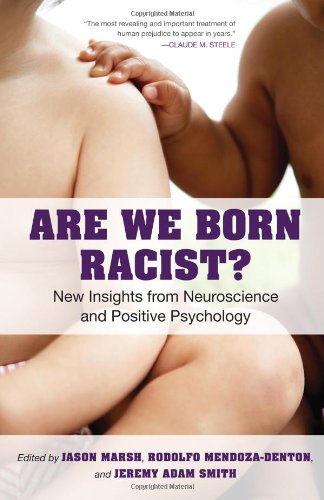I've gleaned from the book that there are two sources of implicit bias. I'll call them Sorting (the instantaneous calculations our minds use to place people into in-group - "Us" - and out-group - "Not Us"), and Associations (the cultural messages we absorb.)
 Sorting seems to be hardwired into human brains and therefore not a function we can turn off. "Conditioned by millennia of tribal warfare and fierce competition for limited resources, we are always looking for cues to help us make snap judgments about others," Susan Fiske writes in the book's title essay.
Sorting seems to be hardwired into human brains and therefore not a function we can turn off. "Conditioned by millennia of tribal warfare and fierce competition for limited resources, we are always looking for cues to help us make snap judgments about others," Susan Fiske writes in the book's title essay.But an automatic "Not Us" snap judgment about another person doesn't mean an automatic value judgment; it's just data to the brain. We can consciously direct what our minds do with information that is categorized unconsciously.
"In the neuroscience studies looking at race, ... amygdala (vigilance-related) reactions vary by individual, corresponding to other signs of prejudice... (T)he alarms in whites' amygdalae do not go off to famous black faces. Likewise, their brains grow accustomed to new black faces after repeated exposure," Fiske writes. We can affect the brain's recordings by having more interactions with the people it labels "Not Us."
 These interactions can also change our Associations. "Years, even generations, of explicit and implicit cultural messages - gleaned from parents, the media, firsthand experiences, and countless other sources - link particular physical appearances with a host of traits, positive and negative," Fiske reports. It is, it seems to me, another form of hardwiring, often invisible tracks laid down throughout the foundation of society, in our manners and mores, our ideals and our institutions.
These interactions can also change our Associations. "Years, even generations, of explicit and implicit cultural messages - gleaned from parents, the media, firsthand experiences, and countless other sources - link particular physical appearances with a host of traits, positive and negative," Fiske reports. It is, it seems to me, another form of hardwiring, often invisible tracks laid down throughout the foundation of society, in our manners and mores, our ideals and our institutions.Choosing to be vigilant about uncovering what we've internalized - rather than denying that those messages are there because they don't match our intentions or our self-image - is a powerful step towards loosening the grip of automatic bias on our behaviors. And building significant cross-racial relationships and meaningful connections, such as working together towards a common goal, can gradually override even the most fundamental prejudices.



